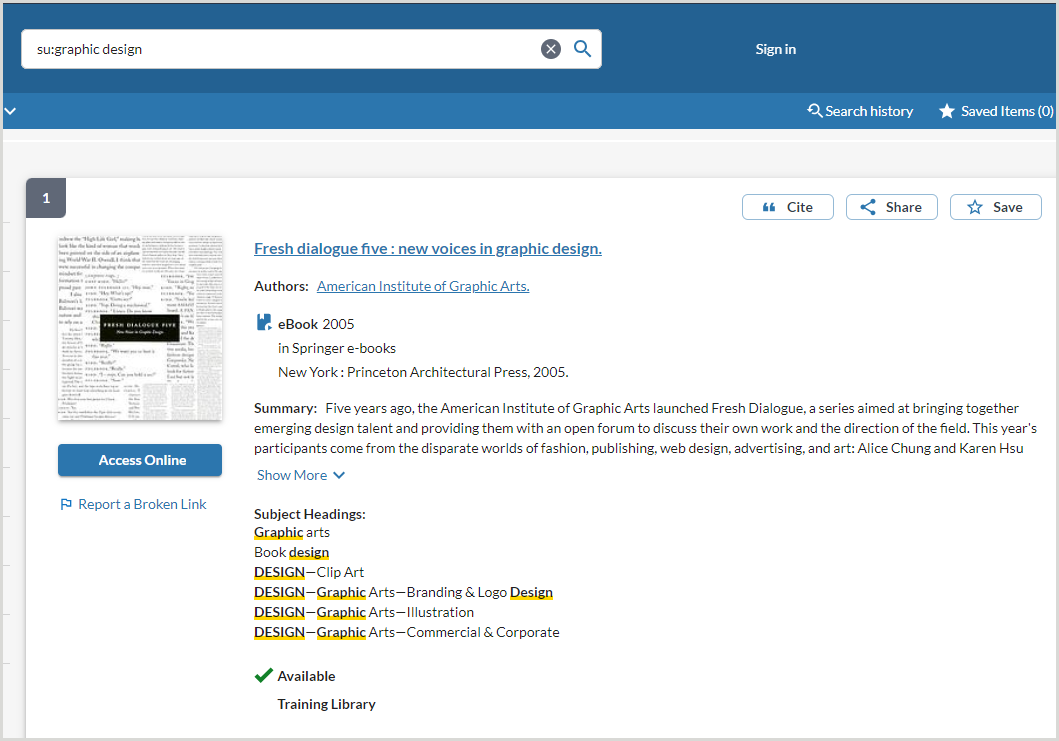Search and use query syntax
About searching
Notes about searching in WorldCat Discovery:
- By default, searching from the search box in WorldCat Discovery will automatically apply the keyword index
- Searches that contain index labels and Boolean operators can be entered in any search box in WorldCat Discovery
- When searching on the Advanced Search screen, if you use an index in a search field, you must use indexes for all search terms
An index is two characters followed by a colon (:) or by an equal sign (=).
- Use a colon to search for the words anywhere in the specified index. For example: rs:unrestricted
- Use an equal sign to perform a phrase search. For example: rs=unrestricted online access
For additional information, see Searching WorldCat Indexes.
Maximum limits on number of words in a search query
To ensure that WorldCat Discovery continues to provide users with timely search results, safeguards for complex queries are in place.
The safeguards place the following maximum limits on the number of words (space word space) that WorldCat Discovery will accept in a search query:
- Maximum number of words allowed in a search query: 30
- Maximum number of words allowed in a search query expanded with related and/or translated terms: 50
Note: To ensure optimum search performance, these supported query lengths could be adjusted in the future. The WorldCat Discovery community will be notified in advance of any changes.
For these limits, WorldCat Discovery counts the following as 1 ‘word’ for query length:
- space word space
- Example: quick
- space “unanchored phrase” space
- Example: “the quick brown fox”
- xx=anchored phrase
- Example: ti= the quick brown fox
Refer to Phrase search for more information about anchored versus unanchored phrase searching.
The limits apply to:
- Searches entered by users in WorldCat Discovery search boxes
- Search history
- Saved searches
- Search alerts
Users are not able to save searches or create alerts from searches that exceed these maximum word limits. An error message occurs when the maximum word limits are exceeded.
Search relevance indicators
Search relevance indicators highlight matching search terms in the result entries. If you add an index label to your search terms, the relevant subject entries will also display in the result set.

Frequently used indexes and syntax
Boolean operators
WorldCat Discovery supports the use of (AND, OR, NOT). Boolean operators must be capitalized.
Index labels combined with Boolean operators can be entered in any search box in including the multiple search boxes on the Advanced Search screen. Boolean searches are processed in left to right order.
When the Boolean AND is used, searches will match on and retrieve the same set or records regardless of the order in which the query terms are entered. The sorting or ranking of the records will vary according to the word order, bringing different records to the top of the search results.
Note: Some complex Boolean searches in the WorldCat.org and WorldCat Discovery interfaces are not supported. These types of queries are prevented to enhance the search infrastructure's overall performance. WorldShare Record Manager and FirstSearch continue to support this index.
For additional information, see Boolean operators in Searching WorldCat Indexes.
Approximate term queries
There are three operators for approximate term queries: asterisk(*), and question mark(?) or pound sign(#):
Truncation
Enter the first three characters of the term (at a minimum) and follow with an asterisk (*).
Example of terms in search results: securit-y, securit-ies, or securit-ization
Example of search: securit*
Wildcard
Enter the first three characters of the term (at a minimum) and follow with a wildcard. WorldCat Discovery supports the use of two wildcard characters the pound sign (#) and the question mark (?).
Use the pound sign to represent a single character.
Use the question mark to match missing (zero) and up to nine characters including no additional characters.
For additional information, see Wildcards and truncation in Searching WorldCat Indexes.
